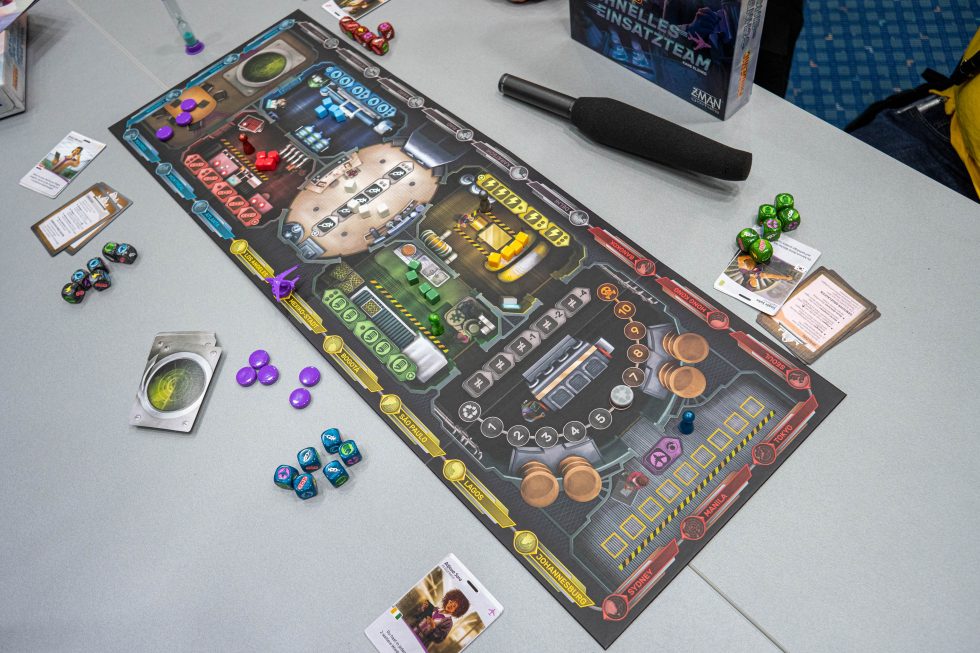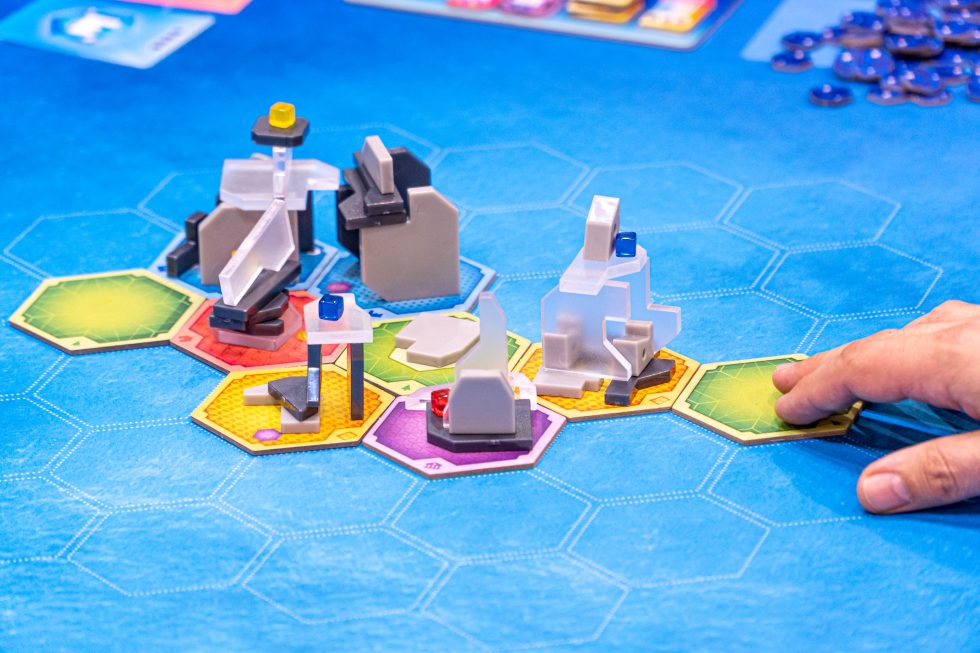Welcome to Ars Cardboard, our weekend look at tabletop games! Check out our complete board gaming coverage at cardboard.arstechnica.com.
For four days each year, the German city of Essen becomes the center of the tabletop gaming universe. The annual Internationale Spieltage fair—better known simply as "Spiel"—sees publishers from around the world unleash their most anticipated new releases.
This year, more than 1,200 exhibitors from 53 countries showed off their games across 86,000 square meters of floor space. With so much to see, its impossible to take in more than a tiny fraction of the games on offer. But for the past few years, Ive been wandering the halls on behalf of Ars readers, hunting for clever, cool, innovative, and entertaining new tabletop titles. So once again I took a deep breath and dove head first into a maelstrom of cards, dice, meeples, and miniatures. And here are my picks from the games I managed to play.
Obscurio
Obscurio
A growing subcategory of board games challenges players to convey information using cryptic collections of images—think Dixit, Mysterium, or Deception: Murder in Hong Kong.
Obscurio is the latest addition to the bunch. It casts you and your partners as wizards trapped in a maze-like magical library. To escape, you need to open a succession of doors and find your way to freedom. Each door shows a different arcane image, and one player acts as a guide, using picture cards and subtle similarities between different illustrations to point everyone else in the right direction.
It might sound familiar to anyone who has played similar games, but Obscurio makes some tweaks to the well-established blueprint. For one thing, the guide can use a pair of magnetic arrows to highlight particular elements on the image cards, drawing players attention to different colors, shapes, and objects. Theres also a limit on how long players can deliberate over their decisions, and taking too long to choose a door incurs penalties which make things tougher in subsequent rounds.
One player also acts as a secret traitor, actively trying to frustrate the groups effort to escape. In a game with such a pronounced element of ambiguity, there are plenty of opportunities to subtly derail your friends progress, and its all bound together with a Hogwarts-style aesthetic.
Pandemic: Rapid Response

With the lineup of Pandemic games growing at a rate that would make a virulent strain of e. coli jealous, its tempting to wonder how far the franchise can expand without running out of creative juice. Rapid Response suggests it has a ways to go yet.
Players control a team of specialists, each with different abilities, rushing to locations around the world to combat epidemics and prevent the fall of civilization. Rather than a map, though, the board now represents a plane, with different sections devoted to producing different types of medicines and resources needed to fight various infectious strains.
Youll do this by rolling and re-rolling dice, using the results to move around the aircraft and complete tasks while en route to the next global trouble spot. What makes this tricky is the remorseless time limit, forcing you to make quick decisions under pressure and inevitably creating more trouble in the process.
Theres a thematically jarring element where you can lose the game because your plane becomes too full of trash. But, like the original Pandemic, Rapid Response skillfully creates a mounting sense of tension. The game wasnt the most fun I had with sand timers at Spiel, however…
House Flippers
This quick and quirky game sees players become rival property developers aiming to buy and sell a succession of homes, using the profits to retire to a life of luxury and leisure.
You start out with a single card—representing a dilapidated house—and a plastic sand timer. Whenever it runs out, you flip it over and receive a wooden cube representing rental income. Rent money and the proceeds from house sales combine to let you buy more expensive house cards, and along the way you can acquire additional timers and staff who increase your takings, allowing you to develop a prestigious property portfolio.
Its reminiscent of Splendor and the Century series of spice-trading games, where players aim to string together a succession of judicious deals as efficiently as possible. But what makes House Flippers deliciously different is that you and your opponents all play simultaneously, snatching helpful cards before your rivals and constantly keeping one eye on your growing collection of timers.
At its core, the game is incredibly simple, but it creates a real frenzy at the table as you frantically claw your way towards the high life.
Marvel Champions: The Card Game
For years, tabletop studio Fantasy Flight Games has produced faithful adaptations of big-name pop-culture franchises. (See the Game of Thrones board and card games, Star Wars X-Wing miniature battle game, and the succession of releases based on J.R.R. Tolkiens The Lord of the Rings novels.)
Fantasy Flight recently added Marvel Comics to its collection of geek-friendly licenses, and at Spiel the company was showing off a new cooperative card battler in which players become mighty heroes working together to take down an assortment of dastardly villains.
Mechanically, Champions feels like a slightly streamlined version of Final Fantasy's now-defunct Warhammer Quest Adventure Card Game. Players go head-to-head with an AI adversary. On each round, the antagonist works to fulfill their schemes, attacks the heroes, or dispatches minions to menace them. To save the day, players have to find clever ways to combine their strengths and overcome a constantly evolving set of dangers and obstacles.
Each player controls a single character, and its impressive how well their stats and abilities reflect their comic book representations. In our demo game, Spider-Man flipped and dodged to negate attacks, Black Panther deployed an array of advanced gadgets, and Captain Marvel used her powers of leadership to coordinate the heroes efforts.
Another nice touch is that heroes character cards are double-sided, with one face representing their secret identity and the other showing their spandex-clad alter ego. Each side comes with different powers, and working out which can be of most benefit at different points is an important step towards victory. The games pacing also does a great job of recreating an adrenaline-fueled comic book fight scene. Even though Im not a fan of superheroes, Id be more than happy to play Champions again.

Trismegistus: The Ultimate Formula
Named after the father of alchemy, Trismegistus is the latest release from Daniele Tascini, the designer of last years thoroughly-enjoyable-if-punishingly-complex Teotihuacan: City of Gods. It casts you and your opponents as aspiring alchemists attempting to conduct mystical experiments and transmute base materials into gold.
Fortunately, thats far easier in-game than in real life. To pull it off, youll draft dice representing various strange substances, acquire arcane artifacts, and publish alchemical tracts to boost your reputation. Its a head-scratchingly complicated process, but Trismegistus only allows players to take a single action on each of their turns, meaning that while a game can take two hours to complete, the action moves along at a surprisingly consistent pace.
To win, you must chain together a succession of small moves to pull off bigger combined effects, and along the way youll pick up some useful new abilities as you expand your knowledge. This is the kind of game you can't hope to master in a single playthrough, and its publisher was only offering one-round taster sessions rather than complete games. But I saw more than enough to make me want to get it to the table again.
Megacity: Oceania

As a rule, dexterity-based stacking games dont come with a lot of thought attached. Releases like Jenga and Junk Art might be fun, but they require steady hands rather than mental acuity. But in Megacity: Oceania, you need both.
The game has players working to build skyscrapers as part of a futuristic floating city off the coast of Australia. Players construct buildings using plastic pieces drawn from a bag, with each structure resting on top of a cardboard hex tile. Different buildings come with different requirements, needing particular pieces in a variety of configurations. Once youve built your masterpiece, you have to carefully push it across the table, linking up with your opponents to form a steadily expanding metropolis without sending all your hard work crashing to the table.
Creating and placing buildings to most effectively boost your score takes careful planning, and maneuvering them into place to form a futuristic skyline is genuinely nerve-wracking. Its a combination of brains and balance youll be hard-pushed to find in any other game.
1987: Channel Tunnel
A small-box, two-player game from Spanish indie studio Llama Dice, Channel Tunnel hands players control of French and British engineers working to build an undersea rail link between their two countries. Despite its diminutive appearance, the game comes with some impressive depth.
Both players want the prestige of carving out a longer stretch of the tunnel than their opponent. To do that, each will need to survey the sea bed, invest in technological upgrades, and raise money to correct any deviations in drilling.
Whats most impressive, though, is the games action selection system, which lets players force their opponent to pay more to carry out particular tasks. Its a simple idea, but it brings a tight sense of economy to the game, and it throws up a string of tricky and interesting decisions. Hopefully it wont be long before the game gets wider international distribution.
5er Finden

Roll-and-write games have been hot in recent years, with releases like Ganz Shön Clever and Welcome To Your Perfect Home earning high praise from fans. But with a glut of similar titles following in their footsteps, there have been plenty of disappointments as well.
5er Finden isnt one of them. A game of quick wits and perception, it sees players roll a set of five dice, showing a collection of colored symbols. Players then scour their square-grid personal player sheets, hunting for groups of five connected spaces showing matching icons.
The idea is not hard to grasp, but its an intense race with everyone trying to spot matching groups before their opponents. Theres also a more challenging “puzzle mode” where players incrementally mark off more of their grids with each passing round, making it harder to find scoring combinations in an ever-Read More – Source






